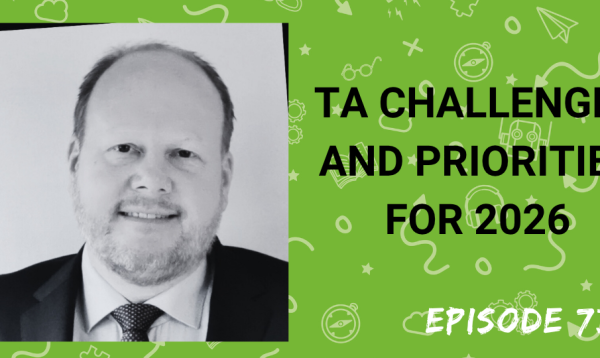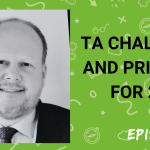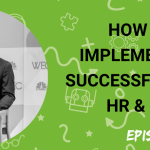Recruiting Future Round-Up is the new monthly show on The Recruiting Future Podcast channel. It’s a short round-up that highlights episodes you may have missed and gives you my take on some of the key learnings from my guests.
As this is my last show of the year, rather than offer you a round-up specifically for the December interviews, I thought I’d round up the whole of 2019 and at the same time take a little bit of a look forward to 2020.
Links to interviews mentions in the show:
Thanks to 4MAT for sponsoring, if you are thinking of replacing or refreshing your careers website in 2020, I would strongly recommend downloading their new eBook.
Subscribe to this podcast in Apple Podcasts
Transcript:
Matt Alder [00:00:00]:
Support for this podcast comes from formatt. Utilizing your careers website to attract top talent can reduce your LinkedIn and job board spend by 40%. If you’re thinking about replacing or refreshing your careers website and you need to gain internal consensus, have a read of Formatt’s latest eBook, Planning and Implementing a New Careers Website Part 1. You can download it by going to bit ly CSP. That’s bit ly CSPebook and that’s all in lowercase.
Matt Alder [00:00:56]:
Hi everyone, this is Matt Alder. Welcome to the second episode of Recruiting Future Roundup, the new monthly show on the Recruiting Future Podcast channel, offering a short roundup highlighting episodes you may have missed and giving you my take on some of the key learnings from my guests. As this is the last show of the year, rather than offer you a roundup specifically for the December episodes, I thought I’d round up the whole of 2019 and at the same time take a little bit of a look forward to 2020. First of all, thanks so much for your feedback on the first episode of Recruiting Future Roundup. The overwhelming consensus was that you want to hear more of my take on the themes discussed and I’m very, very happy to oblige. In 2019, I celebrated the double anniversary of 20 years working in the industry and 10 years operating as a talent acquisition innovation consultant. I wrote my first blog post about the future of recruiting in November 2006 and I’ve been studying industry trends as pragmatically as possible, ever checking back through the 72 podcast episodes I’ve published this year, it’s clear that recruiting is getting more complex and ever more reliant on technology. With complexity comes noise and confusion and it can be difficult to take a helicopter view and get a true sense of what’s going on and how to navigate our changing times.
A few months ago I was putting together some slides for a presentation and wondered how best to make sense of this huge amount of noise around technology driven trends in recruiting. Talk of change in recruiting has been constant for the last 20 years, but in reality it can be very slow to take effect. However, what I’ve noticed is that there’s been a major series of technology trigger points approximately every 10 years that has dramatically shaped the direction of the industry. Twenty years ago it was the arrival of the Internet to the mass market. Online recruiting was born. Traditional print based advertising took a massive hit as job seeking moved online and new norms and habits were formed. At the same time the first applicant tracking system started to appear. Change didn’t happen instantly, though. It was more of a slow fade over the course of the following decade. Ten years ago, social media and smartphones changed the way we communicate, and cloud computing started to change the way recruiting technology worked. This started the era of what I would describe as connected recruiting. However, once more change wasn’t instantaneous and we are still going through the ensuing period of adoption. Ten years later, technology doesn’t stand still and wait for us to catch up. Developments in AI, information processing and an overwhelming move towards technology powered instant gratification mean that we are now moving into another era of recruiting. This era will be defined by data science, artificial intelligence, automation, and qualitative experience. Perhaps the best way to describe this would be intelligent recruiting.
However, as I think a lot of the content on the podcast this year has illustrated, we’re just at the start of a journey here, and while there are some fantastic case studies already, these are still very much outliers from the norm. The evidence from other industries indicates the elements of intelligent recruiting are definitely trends rather than fads, and much of what we’ve heard and Talked about in 2019 is just the start of another decade of change. So if you’re already bored about talking about AI and recruiting, well, I’m afraid there’s a lot more to come.
One final but critically important point about trends and change While it’s easy to get caught up in the lure of the new and the future possibilities of technology, some recent recruiting experiences I’ve witnessed involving close friends and family illustrate that many employers are still not getting the basics right, something that will be having a massive effect on the success of their talent acquisition strategies. Application systems that don’t work at the most basic level, and inaccurate assumptions made about candidates based on bias are still far too common. And don’t even get me started on the negative attitudes to flexible and remote working that still seem to be widespread. Let’s make a collective New Year’s resolution to spend as much time on getting the basics right in 2020 as we do discussing shiny new technology. Audit your candidate experience and apply some proper marketing thinking to your careers website challenge bias, as well as thinking and beliefs in your organization that are creating an outdated view of the talent market.
With so much content on the podcast this year, it would be impossible for me to highlight all of my favorite episodes in such a short space of time. Please subscribe if you haven’t already and check out the back catalog for this year. I’m really proud to have had so many amazing guests guests in 2019, people who are truly changing our industry. What I will highlight though were some of the thought leaders that I had on the show from outside of the industry who were urging employers to think differently about talent. They weren’t always the most popular episodes. It’s very clear that as an audience you tend to prefer listening to the lived experiences of talent acquisition via case studies from practitioners, but I would urge you to listen to the following episodes if you haven’t already, as getting an external perspective is sometimes the only way to drive meaningful change.
In episode 168 I spoke to Bruce Daisley, who’s not just VP Amir at Twitter, but also the author of the best selling book the Joy of Work and host of the Eat, Sleep, Work, Repeat podcast, one of the most popular business podcasts in the world. The main focus of our interview was the fact that science often flies in the face of everyday workplace habits and practices, as well as the importance of psychological safety in the workplace.
In episode 172 my guest was Tom Goodwin, EVP Innovation at Zenith, and another prominent business author. My discussion with Tom was quite wide ranging, but the key part of it for me were his views on why companies need to think and act differently about hiring in our time of digital transformation.
Harvard Business School professor Francesca Gino joined me in episode 183 to talk about her book Rebel Talent. We discussed why companies need to encourage rebel behavior, how rule breaking can be a constructive force, and what companies can do to recruit, nurture and develop rebel talent.
On a similar theme in episode 209 I spoke to journalist and author Matthew Said about his new book Rebel Ideas. Matthew shared his research on the importance of diversity of background, perspective and thought within organizations and the danger that lie in assimilating to the dominant assumptions within a business.
Finally, in episode 204 I chatted to Anna Whitehouse, the hugely influential founder of Mother Pukka. Anna’s message on flexible working needs as wide an audience as possible, and if you haven’t checked out her Flex Appeal campaign, I would strongly urge you to do so.
Links to all of these interviews can be found in the show notes for this episode. So onwards into 2020. What will it bring for talent acquisition? Well, I’m sure technology will continue to dominate our discussions and it will certainly be a year where political and economic issues will be at the front of all of our minds. I’m currently pulling together my key themes for the podcast next year and I’d.
Matt Alder [00:09:19]:
Really like your input, so I’ve set up an audience survey to help shape the show in 2020. You can find it at bit ly recruitingfuture 2020. That’s bit ly recruitingfuture 2020and I would be immensely grateful if you would give me your feedback. I won’t be publishing an episode next week, but I’ll be back the second week of January. There’s going to be some exciting news about the podcast soon, and this will just be the start of a series of very interesting developments with the show during 2020. Thanks very much for listening, and I’d like to take this opportunity to wish you all a very happy and successful new year.








